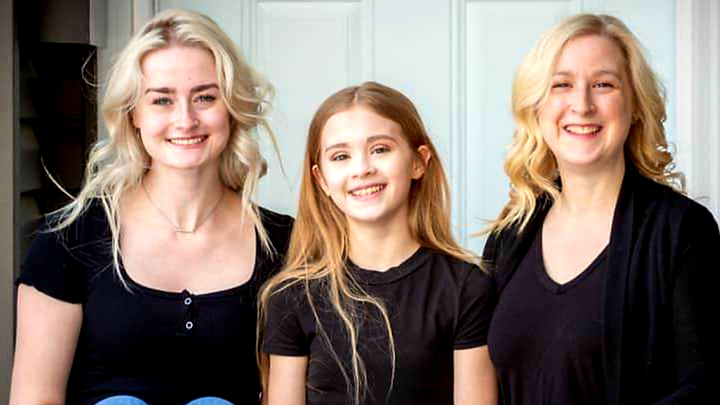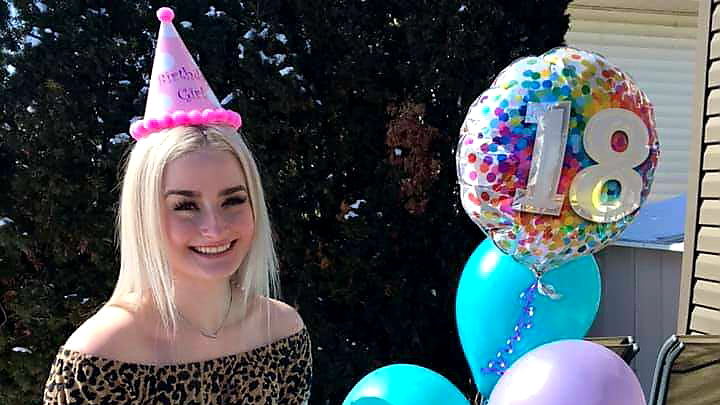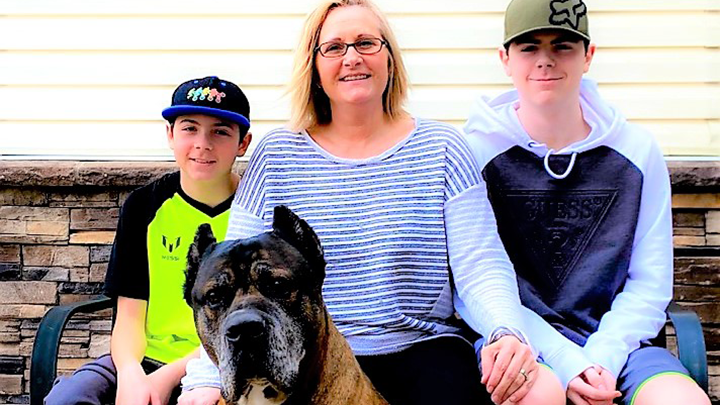
April 29, 2020

When Ilana Anderson (left) turned 18, her sister Sabrina (middle), 12, and mom Miriam (right) came up with creative ways to celebrate Ilana’s 18th birthday at home.
Photo by Jake Bradley Photography

Ilana Anderson’s family surprised her with an 18th birthday celebration at their home in St. Albert. “It was low-key — but awesome,” she says.

Jesse (left), 13, and Jacob (right), 14, strike a pose with mom Andrea Stepanick and dog Zeus on their acreage west of Stony Plain. “I take time each day to talk to the boys, to see how they’re feeling and what they’re thinking,” Andrea says.
Teenagers like to believe they can do anything, that they’re like superheroes. But COVID-19 has clipped their powers, leaving them in an altered reality of physical distancing and staying at home.
For many teens and young adults, the pandemic is cramping their style and short-circuiting their social network. It’s also adding to the typical anxiety and frustrations often experienced at this stage of life.
For parents, COVID-19 heightens the need for loving, honest and, at times, strategic talks with their older children.
“It’s normal for teens — and for parents as well — to feel anxious right now,” says Carla Kembel, a member of the Mental Health Promotion & Illness Prevention team at Alberta Health Services (AHS). “The best way to help kids name and process their feelings is to model it. Talk about your own uncertainties, irritabilities and losses so they know it’s okay to talk about it and sort it out together.”
Equip teens with communication skills to effectively plan to be in their social circles. They need to understand and live within clear boundaries about physical distancing and your family’s “house rules.” Kids sometimes need help to ask for this distance, Kembel says. You can suggest ways they can do it with humour and clarity and without “spoiling” others’ fun.
With schools closed and many major milestones postponed or cancelled, teens and young adults are aching for their quality-of-life moments. Such as hanging out with friends, going to class, graduating, getting a driver’s licence, working part time, and travelling. They’re being denied — for now at least ̶ some of the biggest moments of their young lives.
Here are tips and examples about getting through the pandemic with your teens.
“Anxiety is a normal and healthy function that alerts us to threats and helps us take measures to protect ourselves,” says Dr. Lisa Damour. The adolescent psychologist and New York Times columnist gave this advice an interview with UNICEF.
“Your anxiety is going to help you make the decisions that you need to be making right now."
This includes — not spending time with other people or in large groups, washing your hands, and not touching your face. She advises parents to remind their teens those actions help keep them safe as well as others. It's how we respect and care for our communities.
If, however, a teen’s anxiety grows and becomes constant, you may need to seek health advice. Contact your primary care provider or call Health Link at 811.
It’s important to recognize the things we can do nothing about. And then act on novel things we can do to seek relief and find balance.
It can be as simple as doing homework or watching a movie — or planning for holidays and special days. As Ilana Anderson of St. Albert approached her 18th birthday in April, her family formed a plan.
“I was very conscious that Ilana would not be able to spend her 18th birthday with her friends or her extended family,” her mother Miriam says. “So I tried to think of creative ways we could make her feel special on her special day. We still made sure we were physical distancing and not meeting with others.”
Instead, they brought a party to Ilana.
Miriam and her younger daughter Sabrina downplayed the birthday as it neared, but secretly decorated the house. When Ilana awoke to disco lights, 100 inspirational notes, balloons and gifts on her big day, it came as a total happy shock.
Ilana says: “Even though I don’t get to go out to a bar or see all my friends, it’s still nice to know my family is just as close to me as my friends. It was low-key, but kind of awesome at the same time. I had everything.”
With older students, keeping up with expectations from school can be challenging. This is especially true for those with attention deficit disorders or organization issues, says clinical psychologist David Anderson of the Child Mind Institute.
Begin with finding a routine that balances schoolwork with socializing, exercising, family time and entertainment. Routines bring structure and security to everyday life. Also see online resources and guidelines from your child’s local school board on how you can support your teens’ studies. It can be an opportunity to learn, explore and solve problems together.
Andrea and Donovan Stepanick live on an acreage west of Stony Plain with their teens Jacob, 14, and Jesse, 13.
“They’re keeping up well with their homework,” Andrea says. “They have enough of that to do...I know they both miss school. Not so much the work, but the socializing. Their friends. That’s what they miss the most.”
When her sons aren’t playing video games or chatting online, Andrea encourages fresh air and exercise.
“I think it’s easier being on an acreage because the kids can get out more. They were skidooing, and now they’re dirt-biking out in the yard. I think, being acreage kids, they have more of an advantage when it comes to physical distancing, keeping busy and not going stir-crazy.”
She adds: “I take time each day to talk to the boys, to see how they’re feeling and what they’re thinking. That’s the most important thing for me.”
You can point your teens to a new craft or project. Share funny videos or memes, or play a new board game. Taking walks, exploring parks and riding bikes are perfect outdoor activities for spring and summer. (Remember physical distancing and hand hygiene.) As well, encourage your teens to get a healthy night’s sleep. This is also a great time to learn how to cook (or cook more) and encourage healthy eating.
Practise online safety and discourage watching too much pandemic news. Also, point your teens to reputable information sources.
The B.C. website Foundry says: “When things change so quickly, it can be hard to know what information is accurate. It’s helpful to keep up-to-date but it’s also okay to switch off your devices if this is getting too much.” The B.C.-based site offers young people ages 12-24 health and wellness resources.
See their tips for when the news stresses you out for advice on how teens can take care of themselves.
Tap into your teens’ creativity and encourage them to use more than the internet to connect online with their friends. Or borrow one of these ideas:
Chat and play games online while sitting outside (within range of your home’s wifi connection).
Make up a version of “I spy” or a scavenger hunt (connect by phone or video call while or when sharing results).
Set up a game of “window charades”.
Use Tik Tok or other video software to show funny and innovative ways of interacting while physical distancing.
Parking in empty parking lots and play games or visit (with physical distancing, of course. Some people have dance parties or play music.
Have a driveway to doorway visit. If you drive your teens to such a visit, you can keep an eye on things from the car. You can also do family visits this way with relatives and friends.
It’s also important your teens to work out a screen-time schedule with you. Too much time on screens and social media can be unhealthy and amplify anxiety.
Talk to your teens about avoiding substances such as caffeine, alcohol, cannabis or other drugs. These are sometimes used to cope with stress. Healthier options are going outside, exercising, journaling and talking with someone. Be the person you want your kids to be. Set a good example.
There’s always the danger people at any age can develop substance-use problems.
Isolation over long periods can sometimes increase stress and affect teens’ and parents’ mental health,” Damour adds. “If you’re worried about your own safety or someone else’s safety, people are here to help.”
Here’s where you can find it: